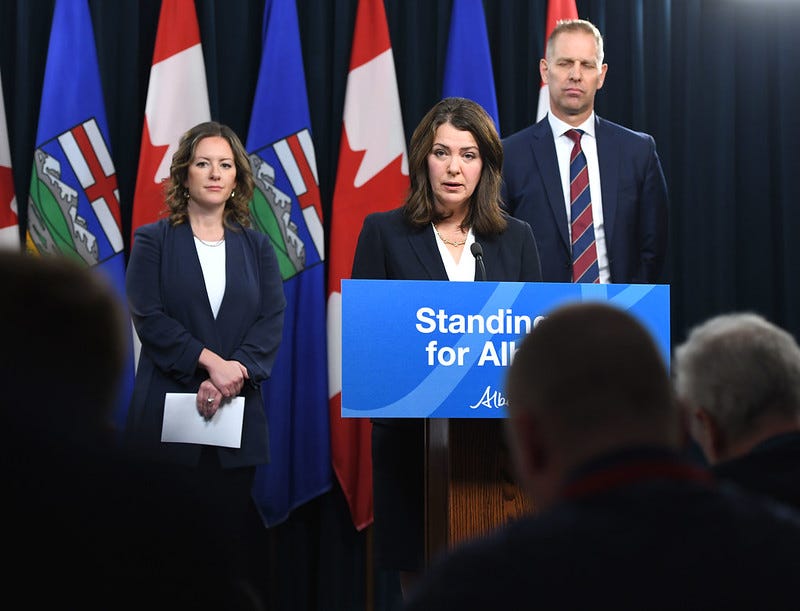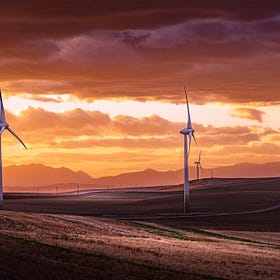The Sovereignty Act Cometh
Premier Danielle Smith is invoking her signature piece of legislation to pressure the feds to renege on their clean electricity mandate for 2035.

She finally did it.
Premier Danielle Smith invoked her signature Alberta Sovereignty within a United Canada Act for the first time on Nov. 27 in response to the federal government’s mandate that Canada’s electricity grid be net zero by 2035.
At a press conference with two of her trained seals — Environment Minister Rebecca Schulz and Affordability and Utilities Minister Nathan Neudorf — Smith described the feds’ target, with dramatic flair, as:
absurd, illogical, unscientific and unconstitutional interference in Alberta’s electrical grid by a federal government that simply doesn’t care what happens to our province as long as they have a good, virtue-signalling story to tell their leftist friends and special interests.
“We refuse to meekly accept actions which are so plainly destructive to Alberta’s economy and to the very safety and security of Albertan citizens,” she added.
A government news blast after the motion was introduced in the Legislative Assembly said the federal regulations put “Albertans and their businesses at risk of freezing in the dark at -30 C.”
At which temperature, one might ask, does a business freeze in the dark?
The federal government regards its Clean Electricity Regulations (CER) as an important stepping stone along the way to full net zero by 2050. But Smith wants the clean electricity mandate to be extended until then.
So, in effect, Smith is proposing to skip the first step and somehow scramble towards full carbon neutrality, in electricity generation and otherwise, over the next 27 years.
Most of Canada is well on its way to the 2035 goal. A full 80% of the country’s electricity grid comes from sources such as hydro, nuclear, wind and solar. But Alberta, with its dependence on natural gas, is just 10% of the way.
Good thing Alberta has a booming renewable ener — oh wait.
Experts baffled by Alberta's renewable energy pause
The Alberta government is pausing approvals for new wind and solar energy projects for the next seven months as it reviews where they can be built, how increased renewable development impacts the province’s power grid and what happens once these installatio…
The legislation Smith introduced Monday, which is certain to pass in some form given her majority government, proposes four things:
It prevents all provincial entities from implementing any federal electricity regulations “to the extent legally permissible;”
Introduces vague reforms to Alberta’s electricity system to guarantee affordability and dependability;
Orders a study of the feasibility of creating a provincial Crown energy corporation invest in natural gas power;
Calls on the provincial government to use “all legal means necessary” to disobey the federal regulations.
Did Smith need to invoke the Sovereignty Act to do any of these things?
No, she told reporters at the news conference, but it’s more fun that way.
In the words of Edmonton Journal reporter Matthew Black, Smith invoking the Sovereignty Act would “give the changes more attention.”
Smith admitted she was looking to establish a Crown corporation because she “cannot give direction to a private sector company to defy the law,” but that if they need a hand, the Alberta government will be there.
“While the motion does not call for Alberta officials to break the law, Smith said they will work out some kind of provision to shield them from prosecution should it come to that,” Canadian Press reporter Dean Bennett noted.
Never a good sign when a lawmaker is developing mechanisms to shield themselves from prosecution.
Speaking before the legislation was introduced, NDP Leader Rachel Notley focused her criticisms on the Sovereignty Act itself, rather than the CER.
The act, Notley said, “undermines investment certainty[,] challenges our respect for the rule of law[,] breaches treaty rights all over Canada, but especially here in Alberta, and it declares to the world that we just don’t care about tackling climate change.”
In the Legislature, Notley aptly characterized the Sovereignty Act as an “unconstitutional temper-tantrum.”
As Barry Cooper, one of the act’s progenitors, acknowledged in a June 2022 National Post op-ed, that’s precisely the point.
Federal Energy Minister Jonathan Wilkinson told CP that he felt bamboozled by the Sovereignty Act declaration, since he thought his meetings with provincial officials concerning the CER were going smoothly.
Um — has he never heard the premier speak?
Chris Severson-Baker, executive director of the Pembina Institute, a clean energy think tank known for its conciliatory approach towards the fossil fuel industry, called the province’s pushback against the electricity regulations a “dead end strategy.”
“Alberta has no plan to decarbonize its electricity supply and this action, in addition to its decision to place a moratorium on approvals of clean, cheap renewable energy, highlights how deeply unserious Alberta is about doing its fair share to reduce emissions,” Severson-Baker said in a news release.
He noted that not only is Alberta in a position to establish a net-zero electricity grid by 2035, but that doing so would save energy consumers at least $600 a year, according to a report Pembina and the University of Alberta put out in June.
Smith’s policy has nothing to do with saving consumers money, but everything to do with saving fossil companies money by delaying the inevitable.
The final CER, by the way, have yet to be released. Smith isn’t exactly trying to conceal the fact that this move is designed to influence their outcome.
The draft regulations, which Smith so vociferously opposes, already allow significant leeway for natural gas power generation as long as it uses hypothetical carbon capture, utilization and storage technology.
Given the general spinelessness of the federal Liberals, combined with their continued penchant for fossil fuel subsidies, don’t be surprised if they cave further.
In other news …
Ontario Premier Doug Ford has reached an agreement with Toronto Mayor Olivia Chow, in which the province uploads the costs of the Don Valley Parkway and Gardiner Expressway while the city abandons its opposition to turn Ontario Place into a private spa and waterpark.
The federal NDP is willing to extend its end-of-year deadline for pharmacare legislation — a key condition of its supply-and-confidence agreement with the governing Liberals — a month after its membership voted in support of a motion to pull the plug on their agreement if the Liberals won’t commit to a universal program.
India is collaborating with the U.S. on an investigation into the alleged attempted assassination of a Khalistani activist Gurpatwant Singh Pannun on American soil, but not with Canada on the killing of Khalistani activist Hardeep Singh Nijjar in B.C., which India’s high commissioner to Canada says is because the Canadian allegations are too vague.
A temporary truce between Israel and the Palestinian militant group Hamas has been extended by two days, allowing further prisoner exchanges and more humanitarian aid into the besieged Gaza Strip, where three-quarters of the population has been displaced after seven weeks of Israeli bombardment.


